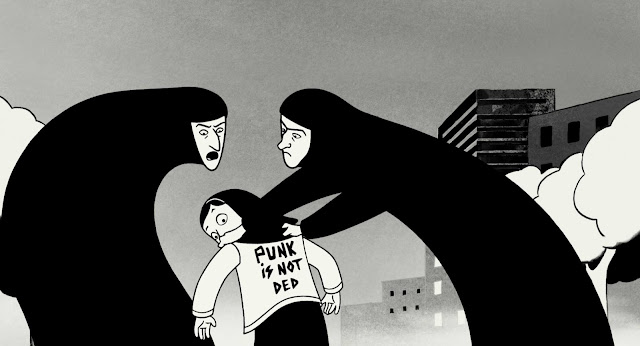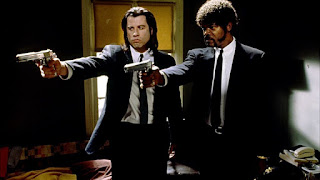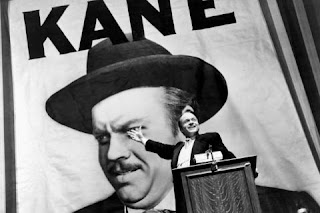This is a topic near and dear to my heart because I feel like I never quite manage to say what I'm trying to when I explain it to people. Simply put, I dislike the idea of there being a list of "classics" in any media or genre. I don't like that there are some books you "simply must" read and that there are some movies that are "essential viewing" and that some television shows are "must see TV". Or rather, it's not that I hate these classifications, it's that I'm inherently suspicious of them.
Who decided this? Who chose these books or those movies or this television show? Who determined that The Killing Joke was required reading for anyone who wanted to get into comics and that Watchmen was the highest point a comic could aspire to, while leaving works like Persepolis or Squirrel Girl to be funny little diversions. Not classics, of course not, just interesting footnotes.
Who decided that?
I suppose part of the reason this is at the forefront of my attention is because, yet again, my proposal to write a book on the "alternate canon" of women in television has been denied. It bothers me because I keep submitting this book proposal - stupidly banging my head against the door - to an editor who sends email after email begging for book ideas about the golden age of television and all these great new shows coming out. He wants books about Breaking Bad and The Sopranos and Mad Men and the other TV shows that changed the game.
But he doesn't seem to want a book about Buffy the Vampire Slayer and Xena: Warrior Princess and Veronica Mars and Gilmore Girls and Scandal and all those shows that changed the game for me. Because those shows aren't classics. They're not the new canon of television we all agree completely revolutionized the form. They're not essential to the narrative.
It bothers me. Obviously it bothers me because it dings my pride, that's not hard to figure out, but it also bothers me because it excludes my opinion as a critic and as a fan. It takes away the voice I have. If this is some conference that was set up where all the people who love television were invited and voted on what was the best expression of storytelling in televisual form, did my invitation get lost in the mail?
I also have been thinking about this topic because my mother happened to mention the other day that she and my father couldn't get through watching Pulp Fiction. They tried, because they believe in being culturally literate and they've heard it was a classic, but they got halfway in and hated every minute, so they turned it off and have since not finished watching it. My parents are the kind of people who care a lot about being culturally savvy, and I appreciate that about them,* but I could have told them right off the bat that they weren't going to like Pulp Fiction. There is basically no universe in which that would be a film my parents enjoy.
Who picked Pulp Fiction as a movie that you have to see in order to be considered cultured? And, for the record, I'm not against the idea of people having broad cultural backgrounds, either. I am actually in favor of people being culturally literate to their best potential. I endorse the idea of wanting to see the best films from the best directors and the best actors, of reading the best books. I think that there's a lot of value in trying to pin down art that is done exceptionally well and consuming it.
And I do think there's value in having a sort of collectively agreed upon understanding of what those best art works are. It creates a sort of cultural shorthand. For instance, if I were to tell you that something was like Jurassic Park meets Casablanca, one, you would immediately have two pictures in your head - regardless of whether or not you have seen either of those movies - and two, you would start thinking of the plot for that amazing movie that someone needs to make please.
It's shorthand and it's very helpful. Because we have these stories we all sort of agree to be aware of, we can skip past a lot of work in trying to talk about difficult concepts. It's a shared vocabulary of sorts. Saying that someone was acting like a total Ebenezer Scrooge today means something we all agree to understand. That's incredibly useful.
On the other hand, I didn't get any say in the pieces of media that have become our canon of classics, and I'm frankly not all that jazzed about them. I've mentioned before that I don't particularly care for Charles Dickens (except for the film adaptation of Nicholas Nickleby starring Charlie Hunnam and of course The Muppet Christmas Carol), but it's bigger than my beef with any one person or story.
My problem with the classics is that they send the idea that great art, the art we should all aspire to, is almost exclusively done by rich white men who are dead now. Sometimes art is done by poor white men or middle class white men, but if we look at the canon, it seems clear that art as we understand it, great art that is to be consumed and marveled at and should shape our culture, is done by a tiny fraction of humanity and no one else counts.
For example, why the hell isn't Do the Right Thing higher on everyone's lists of great American movies? It's an incredible film and personally I found it a lot more compelling than Citizen Kane. If we're talking about films that shifted the paradigm and meant something culturally, then what's the deal?
Or how about including the incredibly popular novels of the nineteenth century in lists of great American literature? It seems to me that the only real reason they're excluded is because the most popular novels then are what we would call chick-lit today. And, again, this is still a problem. Popular fiction, which is mostly written by and for women, is considered not worth counting when we consider the great works of literature being written in this country.
Who decides what stories are the ones we choose to revere and venerate and remember? Who picks the plots that will shape how we view ourselves and our culture?
Because here's the thing: this is not an academic argument. Well, it's not just an academic argument. This has real world consequences. The overwhelming whiteness (and secondarily maleness) of the classics is a genuine problem because it sends the message to young artists of color that they will never be counted as one of the greats. That there is no representation available for them at the top. And it also sends the message that all great art up until now has been done by white men. That diversity is new and no black people or Asian-Americans or Latinx or Native peoples or anyone else ever contributed something worthwhile to our culture.
That's a very dangerous message to send.
It breaks my heart when my students haven't heard of Phyllis Wheatley, don't know that Helen Keller was a lot more than a punchline to insensitive jokes about disability, don't realize that the first novel was written by a Japanese woman. These people aren't in the classics, aren't considered worth assigning in school or adding to our cultural canon. They're invisible.
Toni Morrison and Octavia Butler are relegated to the "special interests" shelves and Lucille Ball is considered first as an actress and second as a half of a tumultuous marriage, but almost never as the incredibly successful studio head and producer she actually was.
So, again I ask, who picked these classics anyway? Whose choice was it to privilege "prestige dramas" about middle aged white men having extra-martital affairs and sketchy relationships with the law over network dramas where black women triumph over adversity and hold high powered jobs and reach their own levels of emotional complexity? Who decided that James Fenimore Cooper's books were high art, while the books by Frances Hodgson Burnett (which include ones you might have actually read) were sentimental craptrap?
Who voted for this stuff? I sure didn't. My picks would be a lot different. So if anyone does get an invitation to that giant convention where they decide these things, can you bring me along? I have some things to say.
 |
| Namely, that Persepolis is a classic and should be treated as such. |
**Just kidding. I love ballet. It is very essential.






I think a classic should be defined as something that changed the landscape of the media. "Citizen Kane" is a classic because Orson Wells re-defined what directing was with that movie. Does it hold up today? Is it a good story? Do you like it? Maybe, maybe, maybe.... Did it change the way movies were made? Yes, it did. So, it's a classic. "Die Hard" created a whole genre of movies. "Die Hard on/in a...." ergo, classic. "Pulp Fiction" certainly isn't for everyone, but it ushered in a new wave of Independent Cinema, so it's a classic. The Beatles changed the landscape of popular music, so their music is classic.
ReplyDeleteI think you could make a good case for "Buffy the Vampire Slayer", "I Love Lucy" certainly, and probably "Persipolis"? Try this argument with your publisher, maybe you'll get some traction.
Good Luck!
TGnome
By that metic, Babylon 5 would have to be a classic, because it proved that long-term planned stories were something you could do in a TV format. So would Twilight and the DaVinci code, two books I consider execrable, but which both dramatically broadened the reach of their respective genres (and paved the way for much better books in those genres, which might not exist without them).
DeleteThat's not meant as disagreement with your definition, just an observation.
I think Babylon5 was a bit of a classic, but really The Fugitive was ground-zero for that type of storytelling. Twilight is SO derivitive, that it's almost an anti-classic IMO. I've never read DaVinci code, though from what I've heard, it sounds to me that at least "The Name of the Rose" would pre-date it.
DeleteI guess upon further reflection, I would add the caveat that there is a certain level of quality required as well. Just to be groundbreaking is not enough, you have to be competent too. Of course, arguments abound.
Ultimately what I'm saying is, you can't judge a classic by your tastes. I personally can't stand "Moby Dick", or most anything by Dickens, but since they influenced many works that came after them, and were pretty well constructed I have to begrudgingly accept their status as classics.
Coolness,
TGnome
I don't like it, but I think for something to become a "classic" it needs two criteria: widespread success and influence on later artists.
ReplyDeleteThe widespread success can come long after (Mozart, Poe, VanGogh, Firefly), but it needs to happen at some point. There are numerous works that greatly influenced later artists, but if they weren't widely appreciated in their own right, they don't get called "classics."
I think some people would argue that a third criterion would be "stands the test of time." I realize by excluding this one I'm calling "Birth of a Nation" a classic, but I don't think flaws of the art of the time can or should exclude Dickens (painfully wordy) or Gone with the Wind (whitewashing history) from being called a classic.
Who determined that The Killing Joke was required reading for anyone who wanted to get into comics
ReplyDeleteWhich I consider daft anyway. Like The Dark Knight Returns, it's a comic that gets much of its power from your familiarity with the characters and their beats.
He wants books about Breaking Bad and The Sopranos and Mad Men and the other TV shows that changed the game.
One thing that jumps out at me there is that those three shows sound much the same in terms of how they "change the game." And that's assuming that the trials and tribulations of being a stroppy white antihero is much of a new thing in the first place.
It's not like somewhat grubby translations of film noir to the TV screen are bad things, but those shows represent only one way to do that, and one we've seen a lot of times before. Veronica Mars is a very different one, and broadens the genre in a way the next stroppy white antihero never will.
(If I had to pick one recent show I'd consider a true game changer, it would be Strange Empire).
Who decided that James Fenimore Cooper's books were high art, while the books by Frances Hodgson Burnett (which include ones you might have actually read) were sentimental craptrap?
I'm reminded of how Wuthering Heights was an exploration of insanity, obsession, and evil, until it got out that a woman had written it, when it became a naif romance (though at least it's still on the classics list).
Obviously it bothers me because it dings my pride
Your way of analysis is worth being proud of.
After installation, you're going to be able to visit the Ports section and view Sourceas an alternative.
ReplyDeleteESCORT
ReplyDeleteESCORTS
FEMALE ESCORTS SERVICE KOLKATA
KOLKATA FEMALE ESCORTS SERVICE
INDEPENDENT ESCORTS SERVICE
INDEPENDENT ESCOTRTS SERVIC KOLKATA
KOLKATA INDEPENDET ESCORTS SERVICE
RUSSIAN ESCORTS SERVICE KOLKATA
RUSSIAN ESCORTS SERVICE
KOLKATA RUSSIAN ESCORTS SERVICE
FOREIGN ESCORTS SERVICE IN KOLKATA
INDEPENDEN FOREIGN ESCORTS SERVICE
ESCORT FOREIGN SERVICE IN KOLKATA
SEXY FEMALE ESCORTS SERVICE
SEXY MODEL ESCORTS SERVICE
MODEL ESCORTS CALL GIRLS
MODEL ESCORTS CALL GIRLS SERVICE KOLKATA
CALL GIRLS SERVICE KOLKATA
CALL GIRLS IN KOLKATA
KOLKATA CALL GIRLS
KOLKATA CALL GIRLS
CALL GIRLS KOLKATA
CALLL GIRL kolkata